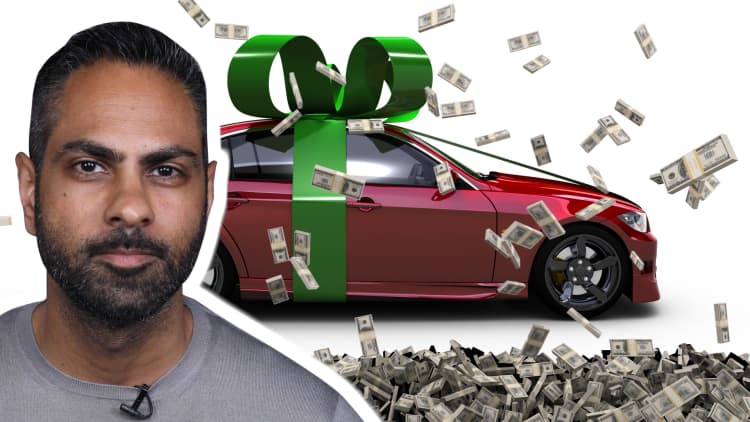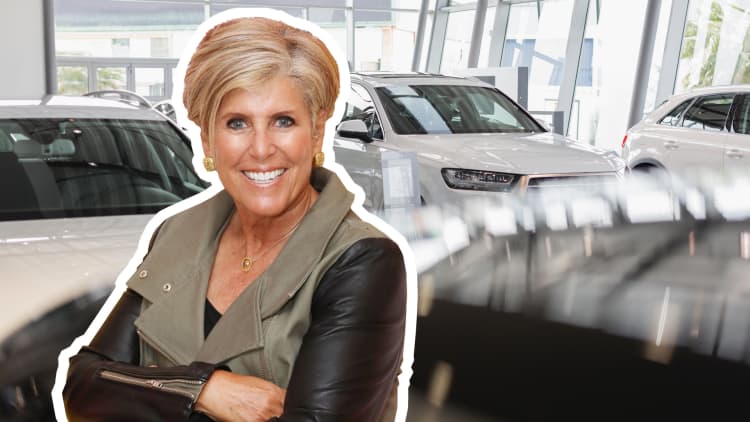For most Americans, buying a car is an investment, so it's important to make sure that you don't get taken for a ride when you shop for a new one.
The average cost of a new car in the U.S. is about $37,400, according to Kelley Blue Book. Meanwhile, the average cost of a three-year-old used vehicle is around $22,600, according to Edmunds.
With those prices, it's not surprising that almost half of Americans think owning or leasing a car is becoming too expensive, according to a survey from Cox Automotive of over 3,000 recent car buyers. And yet that same survey found that Americans are spending less time shopping around for the best deals and making the decision to buy faster.
Making a snap decision on a car is never a good idea, according to experts. You could end up missing red flags that would help you avoid paying too much, or worse, getting scammed.
Here are four things to watch for next time you're in the market for a new vehicle.
1. A price too good to be true
Everyone wants to score a deal, but if you've done the research, and the car is dramatically underpriced, you should be a little skeptical.
There's one common car scam that consumer advocacy organization the National Consumers League flags as particularly egregious. A seller will post a listing for a vehicle, typically a classic or luxury car, that is priced way below market value. When an interested buyer contacts the purported seller, they're told the car is outside the country, but that it can be shipped to the U.S. if the buyer wires the money. Once the buyer sends the money, the seller disappears.
Trust your gut, as the saying goes. "If a deal feels 'fishy' or sounds too good to be true, it probably is," according to the NCL.

2. No upfront pricing
Not only should you be wary of sellers who price too low, you should also stay away from sellers or even car dealers who won't disclose the price upfront.
"If a dealer won't offer a price quote via email, or if the salesperson responds only to say you should come into the dealership for a quote, it's time to find one who will commit to a price in advance," Mike Quincy, an auto specialists with Consumer Reports, tells CNBC Make It.
3. Unnecessary extras
Take the time to dig into the extra options a salesperson may offer. For example, some dealers will try to upsell you with add-ons such corrosion protection, paint sealant, fabric protection, and window etching of the vehicle ID number, Quincy says. "These are all unnecessary," he says, adding they really won't protect your car, and you can usually get them for less money later.
Also don't be surprised if the car salesperson tried to sell you an extended warranty, Quincy says. But Consumer Reports says these aren't necessary on a car with a good reliability record. In fact, 55% of owners who purchased an extended warranty didn't use it for repairs during the lifetime of the policy, according to a survey from the publication. On average, consumers spent about $1,200 for the extra coverage.
4. An unauthorized seller
If you're purchasing a vehicle from a private seller, you need to make sure they actually own it and have the title document. Sounds pretty straightforward, but it's the single biggest verification step buyers need to do, says Grant Feek, cofounder and CEO of online car buying site Tred.
"If they don't have the title document, they might be selling their ex-wife's car against her will. They might be selling a stolen vehicle, or they may be trying to sell a vehicle they don't own because the bank owns it," Feek tells CNBC Make It. Bottom line: You'll have a problem.
"It's crazy how good these fraudsters are," Feek says. When you meet with the seller to see the car, have the meeting in-person and ask to see their driver's license and a second form of photo ID, such as a passport. Check that the name matches the title document and that the seller matches the photos on the IDs. If something seems off, walk away.
"The truth is that there are a ton of great cars out there today," Quincy says. You just need to make sure you do the research in order to find the right one.
Don't miss: The No. 1 step to take before buying a car
Like this story? Subscribe to CNBC Make It on YouTube!



